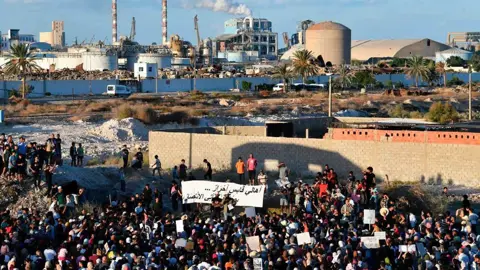Protests Erupt in Gabès Over Industrial Pollution and Health Concerns

Gabès, a city in southeastern Tunisia, is facing increasing tensions after a series of suffocation and paralysis incidents among residents in recent weeks, with the local chemical complex being implicated.
Hundreds of protesters gathered outside the Gabès courthouse to support a legal action aimed at shutting down polluting industrial units. They chanted slogans demanding an end to the "environmental catastrophe" and the dismantling of the phosphate treatment plant, which has been accused for decades of causing serious health issues and degrading the marine and air environment in the region.
During a hearing regarding the potential cessation of the complex's operations, which was postponed, attorney Monir Adouni, representing the plaintiffs, stated that he presented evidence to the court indicating a "crime against the city," with the case set to be reviewed again on November 20.
This unrest follows the release of videos showing students in critical condition after experiencing suffocation in schools. Local authorities reported 22 new cases of suffocation at Chott Essalem school on Wednesday, along with three additional cases at another institution, accompanied by mobility difficulties and partial paralysis, triggering widespread public outrage.
Residents describe the operations of the complex, which has been in operation since 1972, as a "continuing environmental crime" linked to rising cancer rates and respiratory and bone issues. Environmental reports indicate the release of harmful gases and the disposal of phosphogypsum waste laden with heavy metals into the sea.
In response to growing public pressure, the Minister of Environment announced a plan to clean 9,000 hectares of the seabed in the Gabès Bay, while the Minister of Equipment pledged to take "urgent and exceptional" measures to reduce pollution. President Kais Saïed has also tasked a special team with finding immediate solutions to the crisis.
Despite these efforts, the situation remains complex due to the economic significance of the phosphate sector in Tunisia, where the government aims to increase fertilizer production to 13 million tons per year by 2030, raising concerns about balancing economic demands with residents' rights to a healthy environment.
